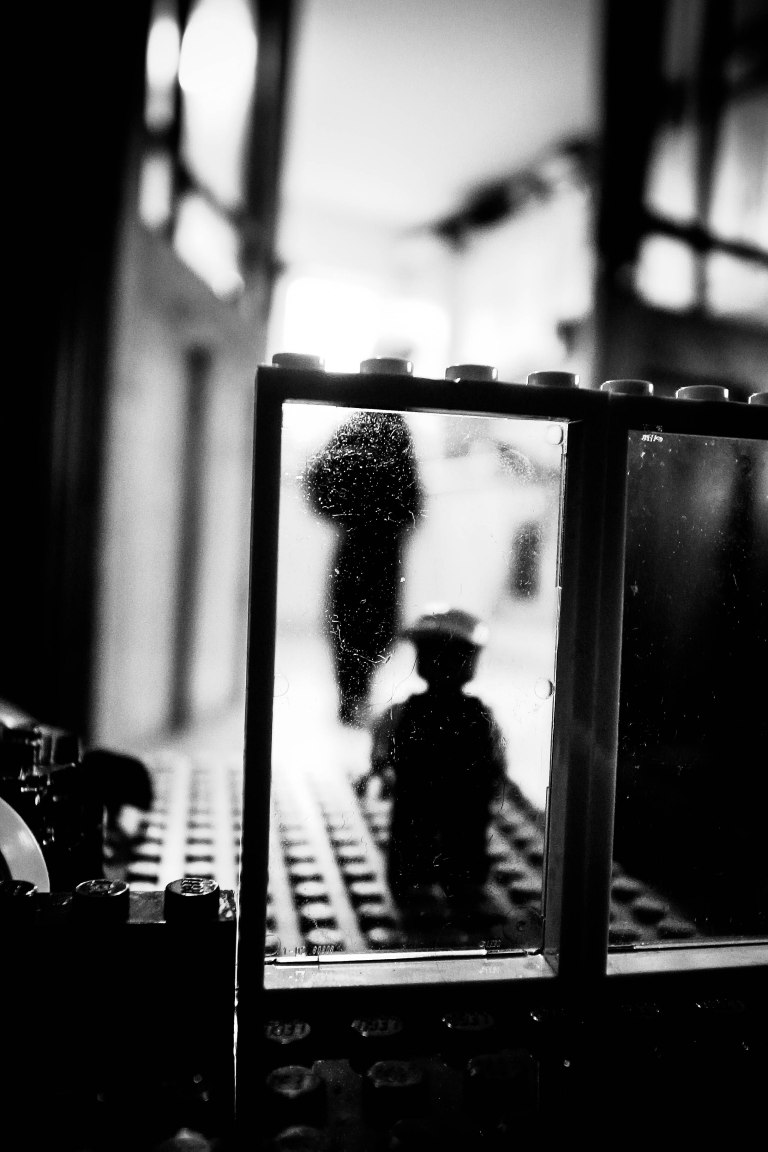
S several years now I’ve been taking photos of my kids’ toys, mainly the youngest one’s, (although some of these are leftovers from his older brothers). While I’ve done this from every conceivable angle, depending on what I’m trying to catch, I keep coming back to the close-in shot, the macro shot, an attempt to replicate the child’s-eye view of these Lego men, dinosaurs, racing cars etc, to capture the macro-intensity of the child’s gaze, their complete interaction with their world.

The concentration is so total it constitutes a parallel world inside our one, an immersion in imaginative play not unlike how we adults focus on our jobs or hobbies, except they seem to be several levels deeper than us. Down where fantasy and reality merge. It’s real to them. (If you get close enough, perhaps, everything becomes real). These photos then, you could say, are a kind of astro-photography, an exploration of a child’s inner space, it’s strange moons and planetary bodies.

Maybe I’m trying to connect to a lost time of childhood engagement with the world. (Maybe that’s what all artists are trying to do). But it’s not just that. The freshness or strangeness of the child’s point-of-view throws the adult world into new relief. We instinctively feel children can see more than us. Think of the history of children as seers, conduits of supernatural powers, possessors of a ghost-seeing sixth sense (or second sight). Part of this recurring belief must relate to the child’s ability to live in the moment, to casually erase the distinction between the known and the unknown. It challenges our confidence in the veracity of our own senses. Despite our waking conviction that the world is solidly knowable, deep down (maybe not even that deep down) we’re not so sure. What if adulthood is a form of (imposed) blindness? What don’t we know? What aren’t we seeing because we don’t concentrate enough, believe enough, get close enough?

Those of us who take photographs know the feeling of discovering the camera has seen more then we have; hidden details, gestural connections, emotional moods. You take a photo thinking it captures one thing only to have it transform later into something else entirely. The camera’s concentration is total, its gaze penetrates beyond our own jerky retinas. So, maybe, the act of photography is akin to the child’s gaze, an attempt to reclaim that lost vision. Seeing the world afresh, like a child.

There is another side to this, of course. A parent’s desire to connect with their child, to get down to their level. Most parents do this without the need to take photos of toys but then I’m weird like that. Toys can become totems of sorts, sacred objects. Think of the poignancy we feel for Victorian toys (in fact the whole abandoned environment of Victorian nursuries). They seem to preserve a rarified innocence, like fossils of childhood concentration. But that ghostly presence also unnerves us. The child’s concentration so total it still inhabits the toy, becomes part of it, haunts it, possesses it. Through these porcelain dolls or rocking horses the past lives on, not just as memory, but something eerier, a portal that contracts time itself.

In the end, though, it’s about being around my five-year-old’s enthusiasms, still relatively free of life’s compromises and reductive realities. (Of course, as charming as it can be, refusing reality can also be a pain in the ass, especially if you’re the parent trying to get him to wear his school uniform or take his medicine. Let’s not romanticise too much here!) Watching him play, though, lying on the ground behind the sofa, acting out full-blooded action, swooping sound-effects, switching between voices, is a vicarious pleasure, an echo of my own childhood games. But I can’t really break back into it. Not even through photography. It’s his world and he’s completely there, through the looking glass, the secret door, the back of the wardrobe. Just try get his attention and see how hard it is to get him back. ‘It’s time for dinner.’ Nothing. I raise my voice, new serious tone. Nothing. Invade his space, touch an arm. Slowly he drags his gaze from the toys, looks at me blankly (Who are you and what are you doing on Cybertron?) Then a deep, dreamy blink, and he’s back. ‘What’s for dinner, Daddy?’
